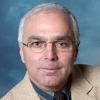
Pope Francis prays overlooking the U.S.-Mexico border before celebrating Mass Feb. 17 in Ciudad Juarez, Mexico. About 550 guests situated on a levee north of the Rio Grande in Texas took part in the Mass. (CNS photo/Nancy Wiechec)
Standing on Mexican soil, less than a football-field's distance from the United States, Pope Francis boldly spoke out on behalf of thousands of desperate migrants trekking long dangerous distances hoping to obtain asylum in the U.S.
On the last stop of his recent pastoral visit to Mexico, in Ciudad Juárez -- the border city across from El Paso, Texas -- the Holy Father in his homily during an open-air Mass said, "We cannot deny the humanitarian crisis which in recent years has meant migration for thousands of people, whether by train or highway or on foot, crossing hundreds of kilometres through mountains, deserts and inhospitable zones."
He continued, "The human tragedy that is forced migration is a global phenomenon today. This crisis which can be measured in numbers and statistics, we want instead to measure with names, stories, families. They are the brothers and sisters of those expelled by poverty and violence, by drug trafficking and criminal organizations."
While the pope had not put a foot onto American territory, he clearly stepped into the U.S. immigration debate; and as always, Francis weighed-in on the side of mercy.
"Being faced with so many legal vacuums, they [refugees and migrants] get caught up in a web that ensnares and always destroys the poorest," he preached.
"Not only do they suffer poverty but they must also endure these forms of violence.
Many migrants fleeing the drug-fueled violence in El Salvador, Guatemala and Honduras, discover that instead of finding asylum in the U.S., they are deported back to the violence where some are gunned-down by the gangs they fled from.
Underscoring this kind of injustice, Pope Francis also said, "Injustice is radicalized in the young; they are 'cannon fodder,' persecuted and threatened when they try to flee the spiral of violence and the hell of drugs."
Reminiscent of when Pope Francis prayed before the Israeli-built separation barrier that divides Israel from the Israeli-occupied Palestinian territory of the West Bank, Francis prayed before a large cross overlooking the U.S. constructed border fence. The cross was built to remember the migrants who have died along Mexico's border.
While approximately 200,000 Mexicans welcomed Pope Francis to Ciudad Juárez, Republican presidential candidate Donald Trump made it a point that he was on the other side of the fence -- literally, politically and spiritually.
Since Trump wants to build a wall across the entire U.S.-Mexico border, he was at odds with the pope's Eucharistic celebration at the border in Ciudad Juárez. He criticized Pope Francis as being a political pawn of the Mexican government.
When questioned about Trump's criticism during a press conference aboard the pope's return flight to Rome, the pontiff (meaning "bridge builder") replied, "A person who thinks only about building walls, wherever they may be, and not building bridges is not Christian." He added, "This is not in the Gospel."
With a thorough U.S. vetting process already in place, the U.S. -- like Germany -- needs to more generously welcome those fleeing for their lives. Yes, building bridges not walls, is the Christian response to suffering.
Also, the serious U.S. drug addiction crisis needs to be comprehensively treated. Imprisoning drug users instead of adequately treating their problems has been a disaster.
Additionally, instead of a failed military war on drugs, the U.S. government needs to provide adequate funds that address problems of dysfunctional families, poor education, unemployment and underemployment in both the U.S. and Central America.
Such a strategy would go a long way in drying up drug use and drug gangs.
During his homily at Ciudad Juárez Pope Francis emotionally proclaimed, "No more death! No more exploitation! It's not too late for change, for a way out, a time to implore the mercy of God. In this Year of Mercy ... I beg for God's mercy."
Then the Holy Father touchingly added, "With you I wish to plead for the gift of tears, the gift of conversion."
[Tony Magliano is an internationally syndicated social justice and peace columnist. He is available to speak at diocesan or parish gatherings about Catholic social teaching. His keynote address, "Advancing the Kingdom of God in the 21st Century," has been well-received by diocesan gatherings from San Clemente, Calif., to Baltimore. His email address is tmag@zoominternet.net.]
Editor's note: We can send you an email alert every time Tony Magliano's column, "Making a Difference," is posted. Go to this page and follow directions: Email alert sign-up.




